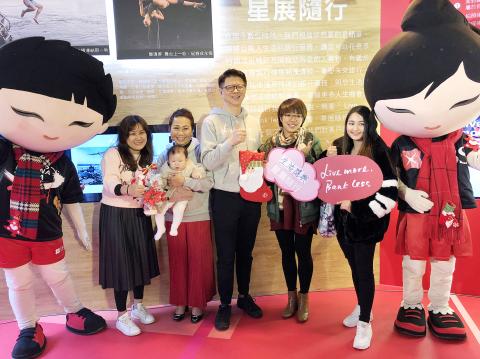DBS Bank (星展銀行) yesterday launched a photography exhibition in Taipei to promote its slogan “Live more, Bank less.”
“Taiwanese really like taking photos, from dinners with friends to visiting temples,” DBS Bank general manager Lim Him-chuan (林鑫川) told a media briefing yesterday.
Lim said he has taken more photographs in Taiwan than he did in Singapore.

Photo: Kao Shih-ching, Taipei Times
With the slogan “Live more, Bank less,” the bank encourages its clients to pursue happiness and spend less time worrying about money management, which the bank can assist with, Lim said.
The bank held a photography contest in October, receiving more than 3,600 entries in three weeks, which proved Taiwanese’s passion for photography, the bank said.
The photo that won is named “That Second When Freezing in Antarctica,” and features one man smiling and almost naked, ready to jump into the Antarctic Ocean, it said.
The bank selected good photos from the contest to display at the exhibition, in Xinyi District (信義) and is to run until Sunday, the bank said.
Asked about DBS’ plans for next year, Lim said that the bank plans to launch a credit card targeting wealth management clients.
DBS has already performed well because of its launch of three new cards this year, Lim said.
While many of its rivals launched credit cards featuring cash rebates, DBS Bank said they are just one way to attract new customers.
“The point is how to develop loyal customers, so that even if the reward decreases, the clients remain due to our services,” Lim said.
Asked about the outlook next year, Lim said that the first quarter is still clouded by the US-China trade war, even though the two nations have called a ceasefire.
The bank suggests its clients hedge against the golbal economic downturn.
“We still think there are a lot of customers in the nation who need wealth management,” and the bank plans to focus on it, Lim said.
As for the online-only banks, DBS said it is still studying possible cooperation plans.

CHIP WAR: Tariffs on Taiwanese chips would prompt companies to move their factories, but not necessarily to the US, unleashing a ‘global cross-sector tariff war’ US President Donald Trump would “shoot himself in the foot” if he follows through on his recent pledge to impose higher tariffs on Taiwanese and other foreign semiconductors entering the US, analysts said. Trump’s plans to raise tariffs on chips manufactured in Taiwan to as high as 100 percent would backfire, macroeconomist Henry Wu (吳嘉隆) said. He would “shoot himself in the foot,” Wu said on Saturday, as such economic measures would lead Taiwanese chip suppliers to pass on additional costs to their US clients and consumers, and ultimately cause another wave of inflation. Trump has claimed that Taiwan took up to

A start-up in Mexico is trying to help get a handle on one coastal city’s plastic waste problem by converting it into gasoline, diesel and other fuels. With less than 10 percent of the world’s plastics being recycled, Petgas’ idea is that rather than letting discarded plastic become waste, it can become productive again as fuel. Petgas developed a machine in the port city of Boca del Rio that uses pyrolysis, a thermodynamic process that heats plastics in the absence of oxygen, breaking it down to produce gasoline, diesel, kerosene, paraffin and coke. Petgas chief technology officer Carlos Parraguirre Diaz said that in

Japan intends to closely monitor the impact on its currency of US President Donald Trump’s new tariffs and is worried about the international fallout from the trade imposts, Japanese Minister of Finance Katsunobu Kato said. “We need to carefully see how the exchange rate and other factors will be affected and what form US monetary policy will take in the future,” Kato said yesterday in an interview with Fuji Television. Japan is very concerned about how the tariffs might impact the global economy, he added. Kato spoke as nations and firms brace for potential repercussions after Trump unleashed the first salvo of

SUPPORT: The government said it would help firms deal with supply disruptions, after Trump signed orders imposing tariffs of 25 percent on imports from Canada and Mexico The government pledged to help companies with operations in Mexico, such as iPhone assembler Hon Hai Precision Industry Co (鴻海精密), also known as Foxconn Technology Group (富士康科技集團), shift production lines and investment if needed to deal with higher US tariffs. The Ministry of Economic Affairs yesterday announced measures to help local firms cope with the US tariff increases on Canada, Mexico, China and other potential areas. The ministry said that it would establish an investment and trade service center in the US to help Taiwanese firms assess the investment environment in different US states, plan supply chain relocation strategies and